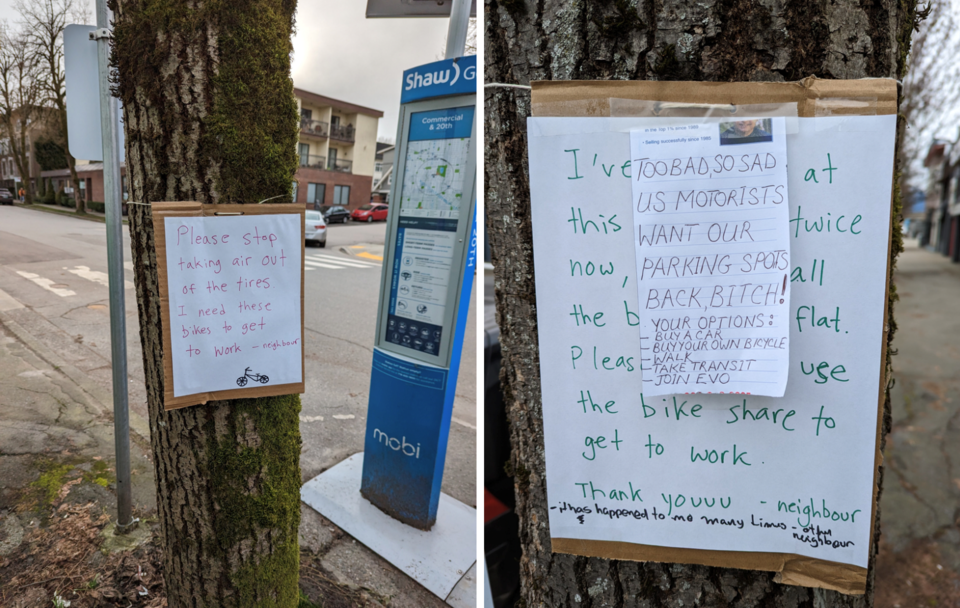A Vancouver bike share station has been the subject of an ongoing dispute.
A war of words between neighbours via paper signs sums up the quarrel at the Mobi bike share station at Commercial and 20th.
"Please stop taking air out of the tires. I need these bikes to get to work," says one sign. In response, another sign declares: "Too bad, so sad. Us motorists want our parking spots back."
The "conversation" was shared on social media by a local on Feb. 16.
Julian Mentasti, who shared the image of the signs online, says that the first sign was put up on Feb. 15 and the response came within 24 hours. All the bike tires were slashed on Feb. 15 as well.
By the following afternoon, five bikes were "fully working" says Mentasti, leaving only one bike with deflated tires.
According to the local, the bikes are usually deflated at night.
Mentasti adds that someone at Mobi told him that there have been three incidents over the past three months. A Mobi spokesperson tells V.I.A. that approximately 30 tires were slashed in separate instances.
The Vancouver Police Department tells V.I.A. that the incidents are being investigated.
'We're not in 1957'
Despite Vancouver ranking the second most bike-friendly city in Canada, there is some perceived tension between cyclists and drivers.
It's an issue that can date back to 1957 when the Motor Vehicle Act was written, explains a spokesperson for the BC Cycling Coalition (BCCC).
At the time, B.C. had a smaller population and cars drove at much slower speeds. "The act, as it was written, was not really written for the types of cars that we have on the road today," the spokesperson says, pointing out increased speed, distractibility, and drivers' expectation that the road belongs to them.
"Tensions have been exacerbated by infrastructure being installed for other road users without any consultation or warning for drivers and cars," she continues.
Taking away parking spots and reducing lanes for cars are a few examples of the way urban infrastructure increases strain between drivers and cyclists.
The ongoing feud at the Mobi bike share station, though a territorial dispute, offers an opportunity to tackle bias and the expectations residents have of cities and urban communities like Vancouver, says the spokesperson.
It also foreshadows a future that drivers may simply have to accept. "The future does not include a lot of parking options for people in highly urban areas," she says, noting the climate, environment, economy, and urban planning as driving factors. "We're not in 1957. We're very firmly into the future at this point."
While drivers' frustrations with Vancouver's changing infrastructure may be directed at cyclists, the BCCC spokesperson points out that they aren't the ones to blame.
"This change is coming from a global community and specifically from government," she says. "It would really help if we were more communicative about that aspect to people, then maybe we wouldn't have people slashing bike tires."



